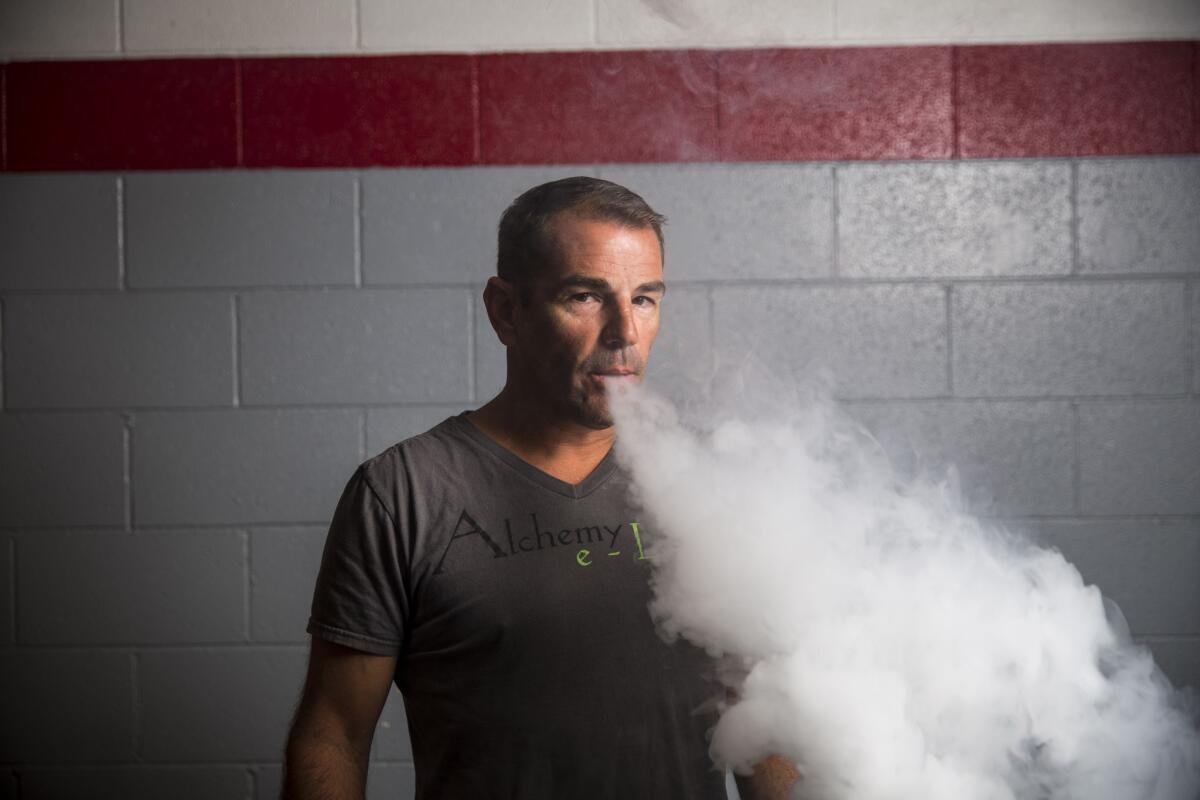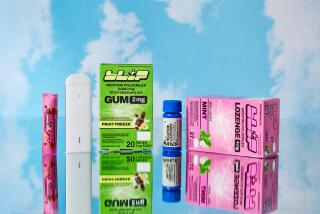Vaping shops say FDA regulation could put them out of business

Alarmed by a surge in nicotine poisonings and the potential for abuse, the FDA is considering rules for the vaping industry, which some say could doom small companies such as Robert Steedâs two vaping stores.
Alchemy E-lixirs is tucked away on a gritty Gardena street littered with rusted lowriders waiting for repairs at an auto shop.
But walk inside the company and youâll see a tidy new laboratory complete with beakers, stainless-steel tables and bottles of colorful liquid resembling snow cone syrup. The liquid is flavored nicotine, worth upward of $40,000 a batch.
Alchemy E-lixirs owners Hooman Atefyekta and Robert Steed have spent thousands of dollars creating the lab, which supplies their two Vapeplace stores with liquid nicotine brews. Customers heat these concoctions with battery-operated devices and inhale the vapors â hence the term âvaping.â
Atefyekta and Steedâs efforts at quality control, however, might not be enough to keep them in business.
Thousands of vaping businesses across the nation face an uncertain future as the Food and Drug Administration considers how to regulate the fledgling industry.
With its thousands of brands of liquid nicotine packs and accessories, the fast-growing industry has had free rein to operate without regard for consumer safety, the FDA says. Alarmed by a surge in nicotine poisonings and the potential for abuse by children, the FDA has started the process of drawing up rules.
If the FDA deems liquid nicotine a tobacco product, as expected by the end of the year, companies would be required to submit applications detailing ingredients, potential health effects and how each product is manufactured.
The process would be prohibitively expensive and time-consuming, vaping shops say â and could put them out of business.
Small companies like Alchemy E-lixirs âdonât have a chance in hell of being able to raise the venture capital to be able to do that,â said Greg Conley, president of the American Vaping Assn., an industry trade group.
Conley said an FDA crackdown could eliminate as many as 99% of the small businesses in the vaping industry. The companies best positioned to survive are the tobacco giants that produce rival e-cigarettes.
E-cigarettes also use liquid nicotine and face FDA regulation, but Altria Group Inc., Lorillard Inc. and Reynolds American Inc. have vastly more financial resources to meet the FDAâs requirements.
âMaking the claim that they are proposing the regulations the way they are written to make a safer product, knowing that the only people who are going to be able to compete is big tobacco, is ludicrous,â said Richard Henning, president of Nicvape, a liquid nicotine wholesaler that supplies about 675 retail locations across the nation, including 200 in California. He worries that FDA regulation will put his company out of business.
E-cigarettes, which use a closed-cartridge system, cannot be refilled with liquid nicotine once the cartridges run out. They have been losing ground to the personal vaporizers sold at vaping shops and online. Those devices are more expensive but can be refilled with an endless variety of flavors with names like Unicorn Vomit, Fruity Fun Cereal and Stoned Smurf.
Both devices use batteries to heat liquid nicotine, converting it to an inhalable vapor.
Personal vaporizers account for $2 billion of the $3.5 billion in sales the vaping industry is expected to generate in 2015, according to Wells Fargo Securities. E-cigarettes account for the rest.
There were 1,836 vape shops in California as of Aug. 3, according to Yelp data, most opening in the last three years. In addition, about 25,000 retailers sold e-cigarettes in California in 2014, the Stanford Prevention Research Center said.
The FDA said increases in nicotine poisonings reported by poison control centers and emergency rooms show that rules are needed. According to the American Assn. of Poison Control Centers, toxic exposures from e-cigarette devices and liquid nicotine increased from 271 in 2011 to more than 3,500 in 2014. In California, toxic exposures rose from 12 reported in 2011 to 243 in 2014. Most of the victims were children under 6.
Studies also show that youths are choosing electronic devices over cigarettes.
Data from the National Youth Tobacco Survey and the Centers for Disease Control and Prevention released this year found that 3.9% of students in grades 6 through 8 were using electronic devices â well above the 2.5% rate for traditional cigarettes. The study also showed that 13.4% of high school students reported using e-cigarettes and vaping devices, compared with 9.4% who smoked cigarettes.
In 2013 California made it unlawful to sell an electronic cigarette or vaping device to anyone under 18.
To ward off regulation, some vaping companies are setting their own standards for liquid nicotine production.
Nicvapeâs Henning started out mixing nicotine juice in a 5-gallon plastic jug on his front porch near Buffalo Lake in Minnesota. The company, with $6 million in sales last year, now operates out of a 30,000-square-foot plant in South Carolina with a pharmaceutical-grade clean room.
Henning is a co-founder of American E-liquid Manufacturing Standards, a trade association encouraging safe practices for manufacturing liquid nicotine. Members agree to verify the accuracy of the nicotine content in their products, ensure the quality and safety of all ingredients, make products in sanitary conditions and use childproof packaging.
Alchemy E-lixirsâ Steed and Atefyekta criticize rival companies that make liquid nicotine in the back of their stores in unsanitary conditions without using masks, proper measuring equipment and eye-washing stations.
âWe donât want to be in the middle of a gunfight between the consumer and Big Tobacco, and the FDA trying to regulate it,â Steed said.
The health effects of inhaling nicotine vapor are still being studied, and there is no consensus within the medical community on its effects. However, the American Heart Assn. has said that vaping is less harmful than smoking a traditional cigarette. Some consumers praise the devices for helping to wean them off cigarettes.
Liquid nicotine is still made with tobacco leaves, however. It takes Alchemy E-lixirs about a week to manufacture a batch of liquid nicotine. First, the nicotine is extracted from tobacco leaves that are distilled through heated liquid.
The nicotine is then mixed with various flavors and sits for a few days to fully blend. From there, the liquid nicotine is packaged and sent to Alchemy E-lixirsâ Vapeplace shops in Redondo Beach and Los Angeles for sale.
The FDA said nicotine manufacturing firms will have two years from the date the new regulations are adopted to comply with new rules.
Despite the uncertainty, Alchemy E-lixirs co-owner Atefyekta says heâs trying to stay positive about the future of the business that he and Steed built from scratch three years ago.
âIf it comes, it comes,â Steed said of FDA regulation. âWeâll test the waters and probably be out of business, and our 17 employees would have no jobs. Every one of us has a share in this thing.â
More to Read
Inside the business of entertainment
The Wide Shot brings you news, analysis and insights on everything from streaming wars to production â and what it all means for the future.
You may occasionally receive promotional content from the Los Angeles Times.










